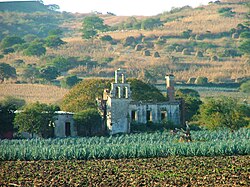Najolk: Difference between revisions
(Created page with "{{Infobox political division|name=Najolk|official_name=Serene State of Najolk|native_name=Estado Sereno de Najolk|image=File:Hacienda abandonada.jpg|image_seal=File:Coat of arms of Puebla.svg|image_flag=File:Flag of Patagonia.svg|capital=Ciuarcia, Oberveros province|GDP_nominal_per_capita=$50,070.47|GDP_nominal=$243,378,244,000|GDP_nominal_year=2100|population_estimate=4,860,714|population_estimate_year=2100|ethnic_groups_year=2100|ethnic_groups=* 56.2% Amalges * 31.9% C...") |
No edit summary |
||
| Line 2: | Line 2: | ||
* 31.9% Cabales | * 31.9% Cabales | ||
* 10.4% Mexal people | * 10.4% Mexal people | ||
* 1.5% Other|image_caption=Buenavista Hacienda|leader_title1=Governor|leader_name1=Ana Salgado Canto|leader_title2=Lieutenant Governor|leader_name2=Inhué Barrueco|established_title=Admitted into the Serenacy|established_date=September 28, | * 1.5% Other|image_caption=Buenavista Hacienda|leader_title1=Governor|leader_name1=Ana Salgado Canto|leader_title2=Lieutenant Governor|leader_name2=Inhué Barrueco|established_title=Admitted into the Serenacy|established_date=September 28, 1966|subdivision_type=Country|subdivision_name=[[Carinansia]]|subdivision_name1=''21''<br>[[Najolk#List of provinces|List of provinces]]|subdivision_type1=Provinces|population_estimate_rank=18|nickname=Traditional State|motto=La verdad nos hace libres.}} | ||
Najolk, officially the Serene State of Najolk, is a state spanning much of the Altiplano in the southern two-thirds of the state, and the southern Eneas rainforest in the northern third of the state. It borders [[San Luis]] to the south, [[Tlanukoy]] to the west, [[Tadea]] to the northwest, [[Terfloria]] to the north, [[Mangulak]] to the east, and [[Anáheiro (state)|Anáheiro]] to the southeast. | Najolk, officially the Serene State of Najolk, is a state spanning much of the Altiplano in the southern two-thirds of the state, and the southern Eneas rainforest in the northern third of the state. It borders [[San Luis]] to the south, [[Tlanukoy]] to the west, [[Tadea]] to the northwest, [[Terfloria]] to the north, [[Mangulak]] to the east, and [[Anáheiro (state)|Anáheiro]] to the southeast. | ||
Latest revision as of 04:46, 5 May 2024
Najolk Estado Sereno de Najolk | |
|---|---|
| Serene State of Najolk | |
 Buenavista Hacienda | |
| Nickname(s): Traditional State | |
| Motto: La verdad nos hace libres. | |
| Country | Carinansia |
| Provinces | 21 List of provinces |
| Admitted into the Serenacy | September 28, 1966 |
| Capital | Ciuarcia, Oberveros province |
| Ethnic groups (2100) |
|
| Government | |
• Governor | Ana Salgado Canto |
• Lieutenant Governor | Inhué Barrueco |
| Population | |
• 2100 estimate | 4,860,714 (18) |
| GDP (nominal) | 2100 estimate |
• Total | $243,378,244,000 |
• Per capita | $50,070.47 |
Najolk, officially the Serene State of Najolk, is a state spanning much of the Altiplano in the southern two-thirds of the state, and the southern Eneas rainforest in the northern third of the state. It borders San Luis to the south, Tlanukoy to the west, Tadea to the northwest, Terfloria to the north, Mangulak to the east, and Anáheiro to the southeast.
Najolk is the eighteenth-most populous state in the Serenacy, with over 4 million people shown to be living in the state in the 2096 census. The state is median by area and has the a low population density among all states. The largest metropolitan area in the state is Greater Ciuarcia, which includes and surrounds Ciuarcia, the state's capital and largest city. The second-largest metropolitan area, Greater Villa Real, is centered in and around Villa Real, the state's second-largest city. The state's subsequent five most populous cities are Baquilla, Frestaca, Catacunga, Valenques, and El Bazales.
Since the state's 1965 admission, Najolkians have been influential in regional affairs. The most senior member of the national government from the state is Vice President Elaine Clemente Melo, during the Bitencourt Administration. Najolk historically was dominated by wealthy landowners and agriculturalists, and today is primarily agriculturally export-based. The state is socially and economically conservative relative to most of the country, and has voted for the Party for the Cárinansian Revolution in all presidential elections since 2073.